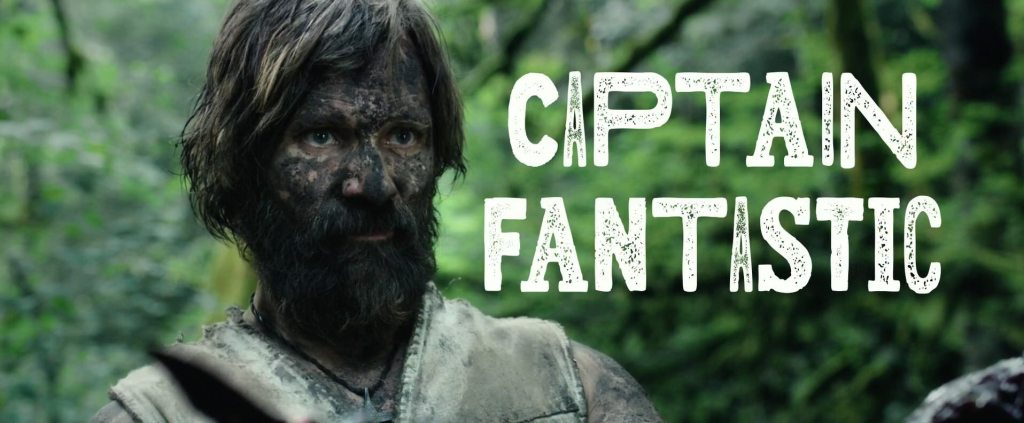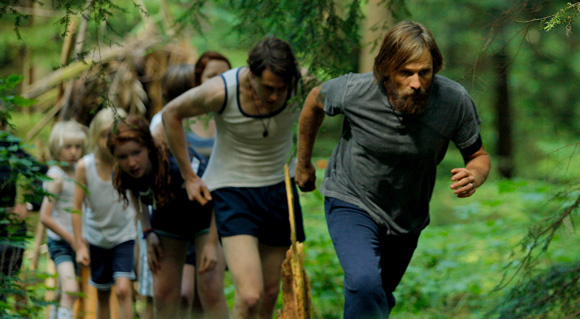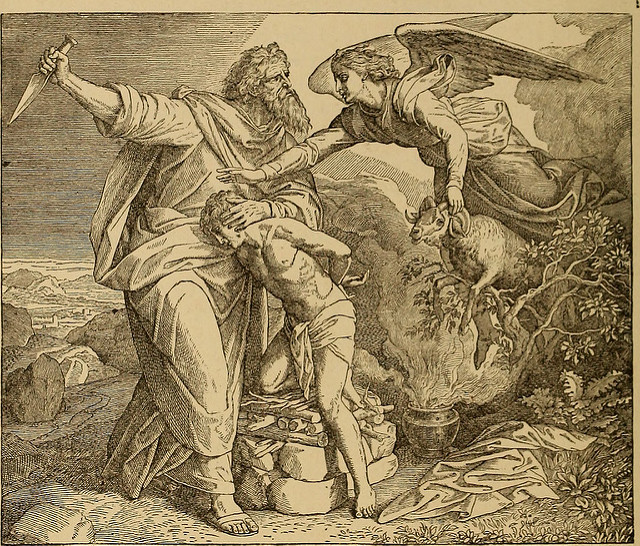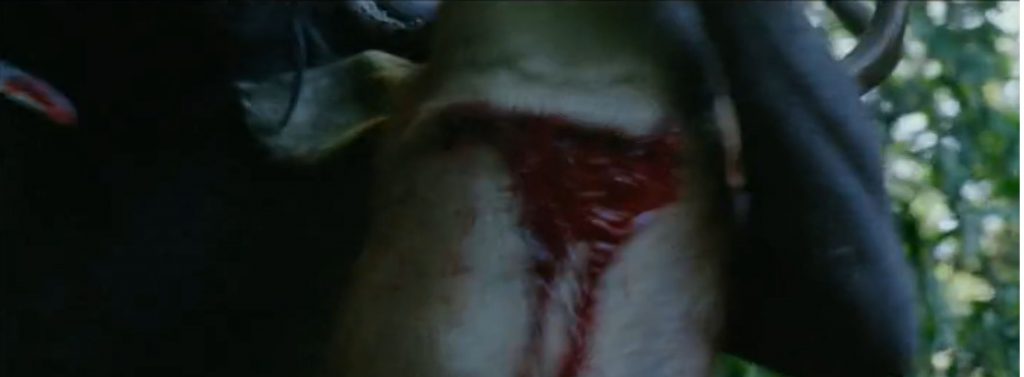When Ben’s world is turned upside down by the death of his wife, Leslie Captain Fantastic [1] sets out to explore the question – what does it mean to be a father?
At first, Ben’s parenting methods are, let’s say, unconventional. In an off-the-grid settlement deep in the forestland of Washington State, Ben strives to inculcate in his children a very ‘unique’ set of skills. The children learn to hunt their own food, scale treacherous mountain faces, learn a variety of languages and read exceptionally difficult books such as Middlemarch and The Brothers Karamazov. In this off-the-grid lifestyle, Ben’s fatherhood is undisputed. Unfaltering in its resolve, veers more towards that wielded by an authorial cult leader than a parent. An extremity embodied by the ritualistic deer slaughter he dictates at the beginning of the film.
However, this all changes when Ben’s wife, Leslie dies; an event of maternal death that forces the family to leave the security of their isolated settlement to attend the funeral in New Mexico, a space representing the capitalism and conventionality Ben despises. Entering New Mexico, the film then takes on the feel of a road movie, and the family struggle with inevitable culture clashes presented by life outside the bubble of their forest home. During this time, Ben’s fatherhood is placed under scrutiny by Leslie’s family and their more conventional ideals of parenting. These pressures of conventionality eventually cause Ben’s fatherly authority to deteriorate as he loses his children to Leslie’s father (Jack), a character who embodies all of the traditional traits of a parent conspicuously lacking in Ben.
Then, just as it all seems to be slipping away from Ben, the family reunite for Leslie’s Buddhist cremation and Ben’s authority is reinstated. The film ending on an overtly sentimental and somewhat corny note with Ben and the children reunited in their new home; an ending that makes clear Ross’s overall intentions to depict Ben’s fatherhood journey in an empathetic and inspiring light. After all, despite all of his wrong-doings or frequent mis-steps, Ross depicts Ben as ultimately embodying the role of ‘Captain Fantastic’.
However, the two deaths mentioned in my synopsis- the deer slaughter and Leslie’s suicide, point towards a pervading issue that, for me, counteracts Ross’s sentimental angle. Watching the film, I saw how Ben’s journey of fatherhood systematically excluded and subjugated any non-male human beings – whether animals or women. Throughout the film, male subjectivity takes centre stage as fathers and sons battle it out, reconsidering and judging their own and each other’s masculinity. Meanwhile, women are either irrelevant, dead or saintly. Animals either meat, taxidermy or sacrificial slaughter.
The mutual degradation of both the animal and the female comes down to the film’s carnophallogocentricsm. Derrida’s notion of Western subjectivity that formulates a “symbolic economy through which male, human, meat-eating, reason-centric, speaking subjecthood is constructed and secured over and against the feminine, the edible, the animal and irrational” [2]. A schema of subjectivity prioritising the male subject, in particular the father, over both women (phallo) and animal (carno) that leads to the subsequent degradation of both categories.
Firstly, regarding the phallo of Derrida’s term, one needs not dig deep to witness the explicit exclusion of the feminine that permeates the plot of Captain Fantastic. Although the film seeks to examine parenting, only Ben, the father, actively speaks and contributes to this discussion. For example, driving much of the film’s narrative are Ben’s consistent arguments with Jack over whether his parenting methods are abusive or not. Meanwhile, because Leslie is dead, the mother is continuously stripped of any privilege to be fully present and vocal. Instead, Leslie comes to embody all of the ‘things’ Derrida argues are systematically subordinated by the privileging of the “rational self-aware, self-present, speaking male subject” [3] in Western society and philosophy. For example, Leslie’s voice only ever appears either as a ghostly figment of Ben’s imagination or through the written word in her letters-consistently falling short of manifesting full presence and full logos. Leslie is further de-valued by assigning the character a bipolar disorder that embodies the irrationality of elated emotions and passions that continually haunts rational, self-aware logocentric closure.
However, rather than posing any threat to phallogocentrism, Leslie’s threat to logocentric closure is used by Ross to constitute Ben’s masculinity. Leslie’s mental illness and death drive the film’s narrative and are consistently used to prop up Ben’s masculine subjectivity rather than threaten it. Eventually, Leslie exits the narrative and Ben is reinstated as the children s only authoritative figure.
The most startling example of how Ross manipulates Leslie’s substantiation as a means of masculine constitution is during Leslie’s Buddhist cremation in which her dead, silenced body becomes a spiritual metaphor for Ben’s own masculine subjectivity. Dragged from the grave, Leslie’s corpse lays on the ground whilst Ben stands superior and upright, using dominant and domineering language to sublimate her death into constituting his masculinity. “My face is mine; my hands are mine; my mouth is mine. But I’m not. I’m yours”. Here, as fully-present, speaking male subject, Ben has the power to use the film’s subordination of Leslie’s subjectivity to constitute his own living subjectivity. Describing the physical presence of his living body, a privilege that Ross’s plot has taken from Leslie.
What is crucial about this scene is that it occurs at the point in the film when Ben’s masculinity is at its most fragile. Prior to the cremation scene, Ben has been on a downward spiral. He has lost his children to Jack, been continually criticised for his treatment of Leslie’s mental illness (often blamed for her death), and he has lost the battle over how she should be remembered – Leslie’s parents holding the Catholic funeral they desired. Therefore Ben, now clean -shaven, has been purged of his aggressive and virile masculinity we see at the beginning and appears to have lost all authority and power.
However, the cremation scene marks a turning point in Ben’s narrative. Through lifting the death of his wife into an egotistical metaphor of masculine subjectivity, Ben regains an authority as he reunites with his children once again. After the cremation scene, the threat of Leslie’s parents is removed and Leslie’s voice is never heard again. All other parental threat is removed and Ben once again, becomes the children’s main authority. Even oldest son Bo exist the narrative before the film ends thus, leaving Ben the only fully grown male within the family unit. Leslie becomes the sacrifice at the altar of Ben’s masculinity.
Clearly this is an innately damaging narrative however, Ross portrays Ben’s journey in a wholly positive and sentimental light. For example, the overtly cheesy rendition of Sweet Child of Mine that follows Leslie’s cremation by the family uplifts the tragedy into a romanticised and spiritual experience for the family. A unified musical collaboration that insinuates Ben’s male superiority remains celebrated and central to the family despite his questionable approach to both parenting and the care of his mentally ill wife. Meanwhile, Leslie’s body is cremated, becoming an object of Ben’s spiritual journey.
Ben’s spiritual uplifting of a dead body into a metaphor for his masculinity isn’t a one off. In fact, he has already occurred in the film. Bo’s slaughter of a wild deer becomes a sort of male initiation ceremony when Ben announced “today the boy is dead and in his place is a man”, as Bo rips his teeth into the deer’s severed heart.
Derrida’s addition of carno to phallogocentrism implies the male subjects’ carnivorous virility; a schema in which “the linguistic identification of “the animal” sustains a sacrificial structure, an economy of relations between animal and human that permits the non-criminal killing of animals in order to affirm the metaphysical reality of “the human”’ [4]. Animals are negated from human-centric logos to maintain a hierarchy between man/animal that upholds human subjectivity. Turned into objects as meat, their consumption affirms masculine subjectivity by proving their superiority as human.
For example, deer slaughter and subsequent flesh consumption is transformed into an Abraham and Isaac like biblical sacrifice. Animal death is elevated into the abstract and metaphysical concept of the male subject and, although Ben’s outspoken atheism removes any theological uplifting, there is still a sense of spirituality created around Ben’s metaphorical ideals of masculine subjectivity. For example, just after Ben announces Bo’s manhood, an ethereal and holy soundtrack is used to lift the deer’s death into a spiritual experience. The choral music rings as the sun glows and the camera pans across the children surrounding the dead deer corpse, Ben and Bo remaining central. A scene that captures a united family with a strong patriarchal centre that’s propped up by the slaughter of the animal. Also, a mis-en-scene that draws startling parallels with Leslie’s cremation and the Guns N’ Roses rendition used to celebrate and lift death into uniting and spiritual experience – once again Ben remaining at the centre. Therefore, it becomes clear that Ben’s subjectivity even before the death of Leslie is built upon transforming living subjects into objects of metaphor. To remain central to the film’s narrative, both the female and the animal must be continuously degraded and de-valued fro Ben to embody the Captain Fantastic role Ross assigns to him.
However, the comparison only goes to far as one can not ignore the startling difference between the two scenes – the differing levels of violence. Leslie’s body is only ever represented as beautiful and complete in death – either as a decorated corpse or a dreamy figment of Ben’s imagination. Meanwhile, the deer’s body is subject to unprecedented gore. For example, the deer’s slit neck taking up the entire shot, the dietetic sloshing of blood formulating both visual and audio gore. The deer is then wrestled to the ground, it’s struggling head captured as it thrashes in pain. Its body is completely exposed, the contours of its flesh put up for view as the camera zooms on its slowing dying chest. Its life then seen slipping from its eyes.
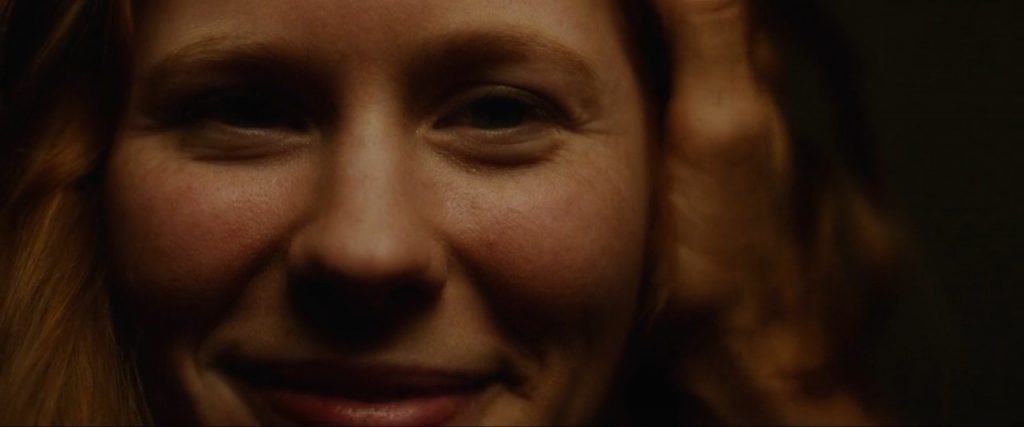
Leslie in Ben’s Dream
Within the human- centred narrative of Captain Fantastic, Leslie despite being debased within the male/female binary, comes out top in the human/animal binary. Whilst animal death is pervasive and normalised throughout the West. Hence Animals appearing as only meat, taxidermy or as targets throughout the course of Captain Fantastic. Meanwhile, human death is not – particularity the tragedy of maternal death. Thus, Leslie’s subordination cannot be visualised violently, particularly given family based nature of the picture. A notion expressed when Ben’s sister refuses to honestly answer her sons question, “why did Aunt Leslie die?” because the answer “she slit her wrists” is far too grizzly.
Meanwhile, the visually horrifying neck slit of the deer is not. Nor is the consumption of animals or Jack’s obsession with hunting (despite his disgust at Ben’s abusive methods of fatherhood). Thus, it’s apparent animal death is so pervasive and normalised that it can be used to fully present the violence of Ben’s aggressive carnophallogocentrism that we never quite grasp in regards to Leslie.
Therefore, what we gain from holding the visual and unashamed violence of animal subjugation against the romanticised exclusion of women is that we are able grasp the fact, this violence applies to both categories – even if we don’t visually experience it. The rose-tinted angle taken by Ross towards Ben consistently mask the inherent violence within Ben’s treatment of women. Even when Vespyr gains substantial injuries after Ben tells her to climb a roof, this is still turned into a redemption arc for Ben as he learn the abusive nature of his parenting methods. A lesson that leaves yet another body harmed at the expense of Ben’s fatherhood.
Yet, with the frame of the deer slaughter – we see that from the very start, what it means to be a father for Ben is the consistent subjugation of subjects. Beginning with the explicitly violent introduction of deer slaughter, it becomes apparent Ben must consistently reinstate and reconstruct his fragile masculinity by subjugating other subjects – whether that be metaphorically or physically. If manhood and therefore fatherhood requires the sacrifice of an animal – then both it’s aggression ad fragility must consistently be propped up by the exclusion and subordination of animal and women.
Sources
(1) Captain Fantastic. (2016). BBC Two [Online database]. Directed by Matt Ross. Entertainment One UK .16 th February 2020. [Viewed 15 th Aril 2020]. Available from: Box of Broadcasts.
(2) Carter, Christopher. Donaldson, Brianne. (2016). The Future of Meat Without Animals. Rowman and Littlefield.
(3) Potts, A (ed.) 2016, Meat Culture, BRILL, Leiden. Available from: ProQuest Ebook Central. [2 June 2020].
(4) Young. K E. (2015) Beastly Politics: Derrida, Animals, and the Political Economy of Meat. The Social, Political, Ethical, and Cultural Theory Archives
Bibliography
Carter. C. Donaldson, B. (2016). The Future of Meat Without Animals. Rowman and Littlefield.
O’Brien.Sarah. (2016) “Why Look at Dead Animals?” Framework: The Journal of Cinema and Media, 57 (1), 32–57.
Potts, A (ed.) 2016, Meat Culture, BRILL, Leiden. Available from: ProQuest Ebook Central. [2 June 2020].
Ross. M (2016). Captain Fantastic. BBC Two [Online database]. Entertainment One UK .16 th February 2020. [Viewed 15 th April 2020]. Available from: Box of Broadcasts.
Young. K E. (2015) Beastly Politics: Derrida, Animals, and the Political Economy of Meat. The Social, Political, Ethical, and Cultural Theory Archives.
